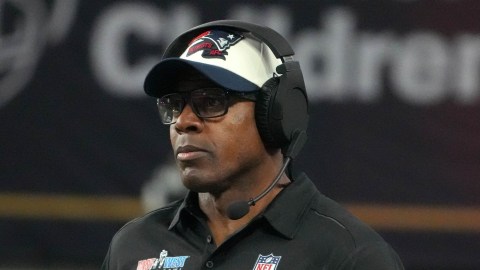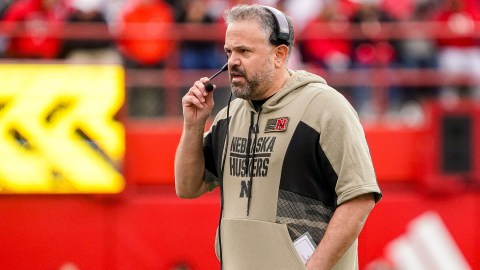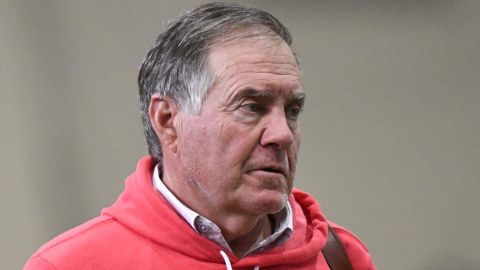The list of NCAA sanctions delivered against Penn State on Monday morning was jaw-dropping.
The punishment was wide-ranging enough that it will bring objections from every side — from Penn State supporters, from football loyalists, from those who think the school isn't responsible for the activities of one very wayward man.
But the sanctions were also narrow — so narrow that they can't undo years of horrible harm, or guarantee that a similar lack of accountability at the expense of young, innocent victims won't happen again.
That's the catch in a world that, for all of its oversight committees and guiding organizations, is ultimately governed by the people within it. People are going to hurt people and try to escape blame no matter what. The NCAA, the U.S. government and any other group, no matter how strong, can never ensure that won't happen — that people won't behave badly, and, even if not deep in evil, that they won't fail to do the right thing.
But the NCAA has done what it can. In a world where people will do what they want, no matter how good the oversight, the NCAA has used its relative strength to try to make a dent in an uncontrollable environment.
That's why, as people question whether the NCAA has overstepped its boundaries in punishing Penn State on a decidedly outside-the-field matter, the NCAA should be lauded. The Penn State sanctions may be outside the realm of what the NCAA has always done, and they may set a scary precedent. But in a horrific scandal where each fresh news break brings a corresponding defense of the people who allowed the abuse and hurt to happen, someone had to step up and make sure Penn State paid. Others have shied away, but the NCAA won't.
The list of punishment is impressive. No, there was no death penalty. Instead of killing off Penn State football, which would have been so definitive it could have distracted from the real import of the situation, the NCAA has merely crippled the Nittany Lions for a good while.
Penn State could have been dismantled, leaving the school to forever whine about how its football team shouldn't have had to pay. Instead, the sanctions put both the university and team in a place where they can be rehabilitated. The legs are cut out from underneath, the impressive figures bludgeoned and shrunk, but Penn State can come back. And if it comes back, it will be a greater testament to true change and caring for the victims than any half-measure could ever be.
The sanctions are heavy, but considering the scope of the scandal and the widespread corruption among the Penn State decision-makers (who could have never been trusted to self-punish), this is the best the school could have hoped for. Recovery is in sight, even if it's far away — and what better way to react to a situation where people's lives were irrevocably destroyed than by allowing for recovery. The only way to stop hurt from making more hurt is to introduce mercy; in the place of complete destruction, leave open a window for the offender to redeem itself and make up its faults to its victim.
Instead of Penn State football going away forever, the school will have to pay a $60 million fine (hefty, until you consider that's how much the university makes from football in a year), lose a huge chunk of scholarships, watch its current scholarship players freely transfer to other schools if they wish, be banned from the postseason for four years, go on probation for five years and see all of its wins from 1998 to 2011 — including Joe Paterno's legendary wins record as a coach — disappear.
Basically, Penn State football is gone for at least five years, if not many more. What's left won't be much more than a jayvee team, as even diehard recruits and enthusiasts won't be coming to State College, Pa., if they have the talent to go anywhere else that isn't covered by a gigantic black shroud that forbids people from paying attention to the Nittany Lions, even if they are good.
But the biggest gut punch from Monday's announcement has to be the forfeiting of wins.
In the speculation leading up to the sanctions, many were thinking about what would happen to Penn State. But Paterno, ushered gracelessly from the school to any early death (and whose statue was even pulled down Sunday in brief hopes that a bit of penance would make the NCAA go easy), wasn't expected to get another kick. He has died physically, and he has died figuratively in the court of public opinion. Aside from a few misguided former players who can't possibly be reading the details of the case as they continue to defend him, Paterno is a finished man.
But the NCAA wanted to do justice Monday, and that meant taking out Paterno, too. For all the times the NCAA can be faulted for how it handles college sports or puts itself on a self-righteous pedestal, Monday's punishment was not only sober but also a desperate try to right the wrong — it was doing what had to be done. Paterno is clearly at fault, and nothing but a giant slap in the face of the fraud that was his coaching career and image would have been enough.
Paterno, as the demigod who ruled Penn State through hidden hubris and seeing the world the way he wanted to, is ultimately the one responsible for the scandal, if not all of the abuse. He is the one who damaged the university. He is the one who took down his own cherished football program. He is the one who allowed irreparable harm to be done by holding on to a castle in the sand even as the people around him failed as human beings. (This is not just about Jerry Sandusky — Penn State players have not been the most stand-up guys for years, and Paterno ultimately manipulated a leadership group at Penn State that should be ashamed of itself.)
One of the marks of this scandal is that, with every horrific new revelation, someone tries to let Paterno off the hook. If it's not former players, it's the students. If it's not the university, it's his family — his family, which suggested the victims aren't being helped when a shrine to the man who perpetuated a hoax to mask evil continues to stand. Believe me, Paterno family — every Nittany Lion logo those victims see for the rest of their lives is going to make their stomach turn. A 7-foot, 900-pound bronze statue surely will, too.
While the NCAA may be questioned for overstepping its bounds, and the football purists may wonder what something like this does to a Penn State team only somewhat intertwined in a scandal very far removed from its day-to-day workings, punishment had to come from somewhere. The university was not going to do the work itself. The Paterno family will not take the blame. The students and supporters will never offer a healing acknowledgement of complete wrongdoing.
But the NCAA, even with its little stick, can at least bring some of the justice this situation merits. The NCAA can turn off the football fun times. It can take away Paterno's wins — and that coaching record that he weaseled away from Bobby Bowden as both men chased win after win like salivating fighting dogs even as their programs continued to be a shell of what had once made both men great.
The NCAA did what few adults within the Penn State community have done throughout all of this — it took responsibility and made a firm decision.It said something bad happened, and that those responsible should be punished. The sanctions may look simple from the outside, but considering how long this mess has dragged on, no one who stands up for firm justice should be faulted. Doing the right thing shouldn't have to be so frustratingly hard.
Some people at the news conference wanted to know what the sanctions mean to the rest of the Big Ten, or whether the NCAA felt validity and power.
"There's nothing in this situation that anyone should feel good about," NCAA President Mark Emmert said.
The decision had been unanimous and very clear, NCAA Executive Committee Chairman Edward J. Ray said.
Overstepping? Too much?
Only as much as evil and pain had been allowed to overstep. Too much.



